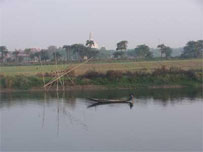Los Angeles, California: June 4, 1998
Tridandisvami Sri Srimad Bhaktivedanta Narayana Maharaja
Today is the auspicious day of the Ganga (Ganges River) coming to this world. Who is Ganga? Ganga has two forms. One form is coming from the lotus feet of Lord Vamanadeva.* [See endnote 1]His lotus feet were worshipped by Lord Brahma, who washed them in the water of the Causal Ocean. Brahma placed that water in his kamandalu (water pot), and from there King Bhagiratha brought it to this world.* [See endnote 2] [Bhagiratha was the king who performed austerities to bring the Ganges to Earth, to save his ancestors.]
There is another history, which is in the Brahma-vaivarta Purana. Ganga is a sakhi, a gopi like Lalita, Visakha, Srimati Radhika, Candravali and others like them. One day Sri Krsna was sitting with Ganga-sakhi, and He was engaged in some pleasant talks. In the meantime Srimati Radhika came and saw them, and She thought, "Oh, Krsna is meeting with Ganga-sakhi?"
Lord Krsna became ashamed and Ganga also became ashamed. She melted and became water, and Krsna did as well. This ashamed Ganga became water, and one drop of that water became the Viraja River (Causal Ocean) - the dividing line between Vaikuntha and this material world. Karanodakasayi Visnu is sleeping in that Ocean, and Laksmi-devi is massaging Him.
This can be compared with Sri Sri Radha-Krsna's pastimes at Prema-sarovara in Vrndavana. Do you know this pastime? Both Srimati Radhika and Krsna became Prema-sarovara. * [See endnote 3] Ganga-sakhi melted in this way - she also remained present in her transcendental body.
So one drop became Viraja, wherein Karanodaksayi Visnu resides. Then, when Lord Vamanadeva's foot reached Brahma-loka, Lord Brahma took some water from that Causal Ocean and washed the lotus feet of Vamanadeva. That bathing water then became the River Ganges in this world. On Earth the Ganges is called Bhagirathi, in heaven, Mandakini, and in Patal-loka, Bhogavati. Thus, this Ganga (Ganges) is Ganga-sakhi also.
Certain people say that if Ganges is the foot water of Lord Krsna as Lord Vamanadeva, how can we then offer it to Krsna or Narayana or any other deity? They say that one cannot offer foot water in their worship to anyone. This is a wrong idea. Lord Sri Krsna's feet, head, eyes, and so on are all the same. Krsna's remnants are also Krsna.
maha-prasade govinde nama-brahmani vaisnave
svalpa-punyavatam rajan visvaso naiva jayate
["Persons who are not very highly elevated in pious activities cannot believe in the remnants of food of the Supreme Personality of Godhead, nor in Govinda, the holy name of the Lord, nor in the Vaisnavas." (Skanda Purana)]
What is the meaning? All these are Krsna.
If someone is taking maha-prasadam, and he is thinking that by taking maha-prasadam he has now become impure, this means he has no faith in maha-prasadam. We should not think like this. A devotee like Srila Sukadeva Gosvami will not wash himself after he has taken maha-prasadam. Rather, he will smear it over his body with his hands and think, "Oh I am so fortunate to receive maha-prasadam. Of course we should not do this; we cannot imitate the maha-bhagavata.
Kanistha-adhikaris have some doubt. They think, "How can we enter Thakuraji's mandira (temple) and offer Him foodstuffs unless we wash first?" We know that these are remnants of Krsna, but remnants of Krsna are also Krsna. You should come in this stage - believe in this way. Of course, if you are not at this stage, you should wash your hands and then go to the temple. At the same time, never think, "I have become impure."
The water of Ganga can be placed in the abhisheka (bathing water) of Krsna. It can be poured on the head of Krsna, and it can also be offered to Him as a drink - no harm. In Jagannatha Puri, the smarta-brahmanas * [See endnote 4] never offer the water of the Ganga to Lord Jagannatha. This is because they are smarta. They are offensive to Lord Krsna's lotus feet. They have dug a well near the Jagannatha Puri temple, and all water for worship is supplied from that well - not from Ganga. If anyone brings Ganga water, the smarta priests will not give it to Thakurji, the deity. We don't think like smarta-brahmanas; we are bhaktas - devotees.
"Maha-prasade govinde, nama, brahmana vaisnave." All these - maha-prasada, pure Vaisnavas, pure brahmanas, the holy name - are Sri Krsna Himself; they are not different, but there are some specialities in each. The Maha-prasadam remnants of Krsna are more powerful than Krsna Himself. Vaisnavas are also more powerful than Krsna Himself.
Krsna cannot come to us. We cannot see Him, but we can see Vaisnavas. Vaisnavas are the embodiment of the full mercy of Krsna. Krsna has to follow some rules and regulations, so that He can come to us or so that we can see Him, but Vaisnavas and maha-prasadam are causelessly merciful.
"Maha prasade govinde, Nama." Lord Sri Krsna's holy names are more powerful than Krsna Himself. He has invested all His power therein.
namnam akari bahudha nija sarva sakti
tatrarpita niyamitah smarane na kalah
etadrsi tava krpa bhagavan mamapi
durdaivam idrsam ihajani nanuragah
["My Lord, O Supreme Personality of Godhead, in Your holy name there is all good fortune for the living entity, and therefore You have many names, such as "Krsna" and "Govinda," by which You expand Yourself. You have invested all Your potencies in those names, and there are no hard and fast rules for remembering them. My dear Lord, although You bestow such mercy upon the fallen, conditioned souls by liberally teaching Your holy names, I am so unfortunate that I commit offenses while chanting the holy name, and therefore I do not achieve attachment for chanting." (Siksastaka verse 2)]
Krsna has to think, "What is the proper time to give My darsana to (anyone)? What is the proper qualification (anyone) must have in order to receive My darsana? However, Nama-deva (the personality of Sri Krsna's holy names) comes even to offenders. Anyone can chant Krsna's holy name, day or night, having taking bath or not. Even while someone is passing stool, he can chant Sri Krsna's name. We cannot take darsana of Krsna or worship Him in an impure state, but the holy name and maha-prasadam are causelessly merciful. We should think like this.
Now it is eight pm, so we will end here. Starting tomorrow, we will explain Bhakti-tattva Viveka in the mornings and Sri Caitanya Caritamrta in the evenings.
[*Endnote 1: [from Srila Narayana Maharaja's Australia 2000 lecture on Gangamata Thakurani:"When Sri Vamanadeva took the universe away from Bali Maharaja, His lotus foot went through the universal covering and touched the Causal Ocean. A drop of that Causal Ocean thus came into the universe as the Ganges."]
[*Endnote 2: The following is excerpts from the Chapter Summaries of Srimad-Bhagavatam, Ninth Canto (Chapters 8 and 9)
"Once, a king called Sagara performed an asvamedha sacrifice, but the horse needed for such a sacrifice was stolen by Indra, the King of heaven. The king and his sons searched for the horse. In the course of this search, the sons of the king came upon the great personality Kapiladeva and thought Him to have stolen the horse. With this offensive understanding, they attacked Him and were all burned to ashes. The king's grandson, called Amsuman, later searched for the horse and delivered his uncles.
"Upon approaching Kapiladeva, Amsuman saw both the horse meant for sacrifice and a pile of ashes. Amsuman offered prayers to Kapiladeva, who was very pleased by his prayers and who returned the horse. After getting back the horse, however, Amsuman still stood before Kapiladeva, and Kapiladeva could understand that Amsuman was praying for the deliverance of his forefathers. Thus Kapiladeva offered the instruction that they could be delivered by water from the Ganges.
"The son of Maharaja Amsuman was Dilipa, who tried to bring the Ganges to this world but who died without success. Bhagiratha, the son of Dilipa, was determined to bring the Ganges to the material world, and for this purpose he underwent severe austerities. Mother Ganges, being fully satisfied by his austerities, made herself visible to him, wanting to give him a benediction. Bhagiratha then asked her to deliver his forefathers. Although Mother Ganges agreed to come down to Earth, she made two conditions: first, she wanted some suitable male to be able to control her waves; second, although all sinful men would be freed from sinful reactions by bathing in the Ganges, Mother Ganges did not want to keep all these sinful reactions. These two conditions were subject matters for consideration. Bhagiratha replied to Mother Ganges, 'The Personality of Godhead Lord Siva will be completely able to control the waves of your water, and when pure devotees bathe in your water, the sinful reactions left by sinful men will be counteracted.'
"Bhagiratha then performed austerities to satisfy Lord Siva, who is called Asutosa because he is naturally satisfied very easily. Lord Siva agreed to Bhagiratha's proposal to check the force of the Ganges. In this way, simply by the touch of the Ganges, Bhagiratha's forefathers were delivered and allowed to go to the heavenly planets."(Excerpts form summary of Srimad Bhagavatam chapter 9.8 and 9.9)]
["That original Personality of Godhead, named Sankarsana, first lies down in the river Viraja, which serves as a border between the material and the spiritual world. As Karanabdhisayi Visnu, He is the original cause of the material creation. (Caitanya-caritamrta, Madhya-lila 20.268)]
[*Endnote 3: Once, Radha and Krisna, surrounded by Lalita and the other sakhis, were immersed in various kinds of loving pastimes (premaya lila-vilasa) when a bumblebee hovered around the beautiful lotus face of Srimati Radhika. Thinking Her face to be a lotus flower, the bee wanted to sit there and drink its nectar; it therefore continued to hover around Her face. Srimatiji became afraid and covered Her face with Her palms. She also tried to chase the bee away, but to no avail. Madhumangala saw Srimati Radhika's distress and chased the bumble bee far away with his stick. Upon his return, he announced, "I have chased madhusudana far away from here. He has gone and will not return." When Srimati Radhika heard Madhumangala's words, She at once thought that Madhusudana Krisna had gone away and had left Her, although She was sitting directly in Krisna's lap. She began to lament, deeply afflicted by separation from Him. She could not at that instant understand that madhusudana also means 'bumble bee'. She wept and repeatedly cried out, "Ha Prananatha! Where have You gone? Ha Prananatha! Where have You gone?"
Upon seeing this amazing bhava, called prema vaicittya, in His beloved Radhika, Krisna also forgot that She was sitting in His lap. He too wept and cried, "Ha Priye!" The tears that flowed from Their eyes and the perspiration that flowed from Their bodies created this pond, after which Radha and Krisna both fainted. When the sakhis saw Them in this state, they too became senseless. Srimati's sarika then began to loudly chant Sri Radha's name, and the suka began to loudly chant Sri Krisna's name. As Their names entered Their ears, Radha and Krisna regained external consciousness and gazed upon each other with great yearning. Gradually, the sakhis also regained consciousness in unlimited bliss and began to call out, Jaya! Jaya! The poet Sri Madhuriji describes this lila in a very charming way.
After this incident, Sri Krisna thought to Himself, "Although I remain close by My beloved Srimati Radhika, I am unable to pacify the suffering She experiences in separation. The heat of impending separation constantly scorches her, and I see no means to console Her. When I am far away from Her, She constantly thinks of Me out of separation. She becomes so absorbed in bhava that She laughingly talks to tamala trees, thinking them to be Me, and plays with Her sakhis. Sometimes She also displays mana. In contrast, when I am nearby, a feeling of separation from Me overcomes Her, and She becomes distressed and cries. In this condition, I am unable to console Her, even when I am right beside Her.
"Thus, Sri Radha can be consoled only by My being far away from Her. In this state of separation, Her fire of separation can be somewhat pacified upon seeing My sphurti or beholding objects like the tamala tree that possess a luster similar to My own. This is because She actually considers them to be Her Priyatama." Thinking in this way, Krisna secretly decided to leave for a distant place. This is the main reason why He left Vrindavana to go to Mathura and Dvaraka.
The bhava that Srimati Radhika displays here is the topmost madana bhava, and is found only in Her. It does not manifest even in Lalita and the other sakhis. In this madana bhava, feelings of both vipralambha (separation) and sambhoga (meeting), as well as all other mutually opposed bhavas, are present simultaneously in an astonishing way. (Vraja Mandala Parikrama book)]
[*Endnote 4: "SarvabhaSarvabhauma Bhattacarya was previously a smarta-brahmana-that is, one who strictly follows the Vedic principles on the mundane platform. On the mundane platform one cannot believe that prasada is transcendental, that Govinda is the original form of the Supreme Personality of Godhead, or that a Vaisnava is a liberated person. These transcendental considerations are out of the ordinary Vedic scholar's jurisdiction. Most Vedic scholars are called Vedantists. These so-called followers of Vedanta philosophy consider the Absolute Truth to be impersonal. They also believe that a person born in a particular caste cannot change his caste until he dies and takes rebirth. The smarta-brahmanas also reject the fact that maha-prasada (food offered to the Deity) is transcendental and materially uncontaminated. Originally, Sarvabhauma Bhattacarya was subjected to all the rules and regulations of the Vedic principles on the mundane platform. Now Gopinatha Acarya pointed out how Sarvabhauma Bhattacarya had been converted by the causeless mercy of Sri Caitanya Mahaprabhu. Being converted, Sarvabhauma partook of prasada with the Vaisnavas. Indeed, he sat by the side of Sri Caitanya Mahaprabhu." (Sri Caitanya-caritamrta Madhya-lila 12.180 purport.)
"A smarta-brahmana is always interested in material profit, whereas a Vaisnava is interested only in satisfying the Supreme Personality of Godhead." (Srimad-Bhagavatam 8.9.33)]
Editor: Syamarani dasi
Transcriber: Janaki dasi
Typist: Anita dasi









